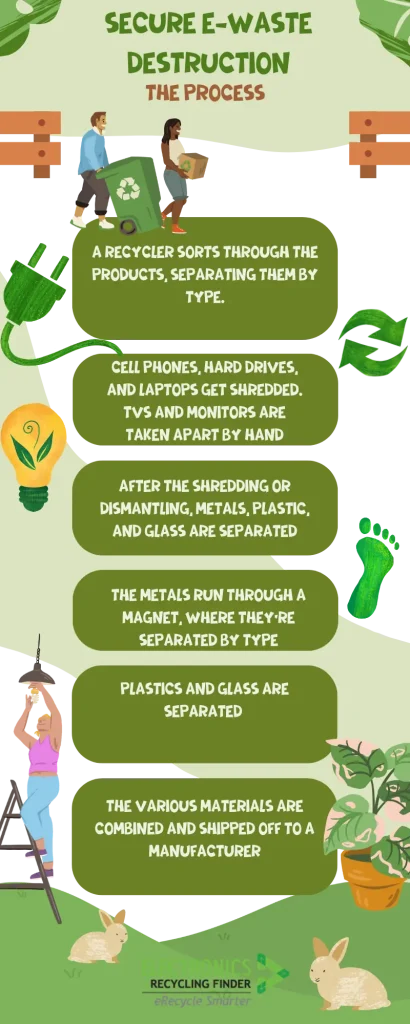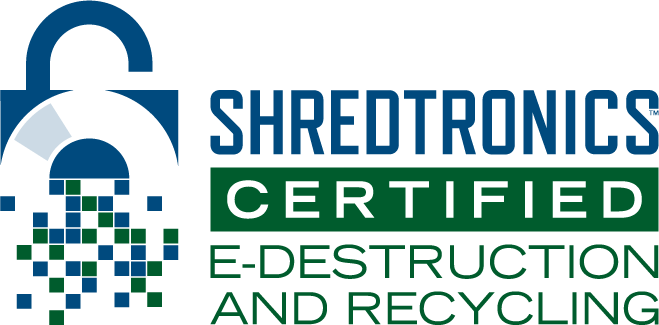
E-waste takes many forms. From the most commonly thought about, cell phones and computers, to the more niche, like smart printers. All of the e-waste we generated played a part in our increasingly digital lives, whether it be connecting us to our friends, or printing out a crucial business presentation. Just as it was important to us during its useful life, it’s important to be mindful during its disposal. Secure e-waste destruction is important, both for the health of the environment, and for the security of your personal data.
Why Secure E-Waste Destruction is Important
If your technology contains any sort of memory device, you need to make sure it’s destroyed properly. While this may sound like hyperbole, the dangers of data theft are very real. Your phone, computer, or even smart tv contains important information, from passwords, to payment information, to sensitive personal information. If left out on the side of the street, or thrown into a landfill, anyone that picks up that technology can access your data.
That’s also the case if you sell your technology without taking the proper steps. It’s always tempting to make money, and if you are going to recoup some of the cost, make sure it is wiped to DOD or NIST standards.
Outside of data security, the environment remains an important concern. E-waste tossed into landfills or improperly disposed of can severely damage the environment. E-waste contains a number of chemicals that, if left to decompose in a landfill, can poison the groundwater and the air.
How Secure E-Waste Destruction Happens
So what happens to the e-waste during the secure destruction process?

The electronic destruction process involves securely and permanently destroying electronic devices to prevent unauthorized access to data stored on them. Here’s an overview of the typical steps:
- Collection: Electronic devices such as hard drives, solid-state drives, USBs, mobile phones, and other storage media are collected from businesses or individuals.
- Data Erasure: Before physical destruction, some companies use software to overwrite existing data on the devices to ensure it is unrecoverable. This step is sometimes done in place of, or in addition to, physical destruction.
- Shredding: The devices are then physically destroyed, typically by shredding them into small pieces. Industrial shredders are used to break down the devices into fragments, rendering them unusable and ensuring that data cannot be reconstructed.
- Crushing/Pulverizing: In some cases, the devices may be crushed or pulverized instead of shredded. This process achieves the same goal of making the devices and their data unrecoverable.
- Sorting and Recycling: After destruction, the fragments are sorted by material type (e.g., metal, plastic) and sent for recycling. This ensures that the materials are responsibly disposed of and can be reused.
- Certification: The company performing the destruction typically provides a certificate of destruction. This document confirms that the devices were securely destroyed in compliance with industry standards and regulations.
The entire process ensures that sensitive information is completely eradicated, protecting against data breaches and ensuring compliance with privacy laws.
The Importance of a Data Destruction Certificate
A critical part of the technology destruction process that you should not neglect is the collection of a data destruction certificate. This piece of paper or digital document signifies the proper destruction of all data located on a piece of technology.
For businesses, it provides liability protection and regulation compliance. For an individual, it provides peace of mind, and you can rest assured that your sensitive information won’t fall into the wrong hands.
How ShredTronics Can Help
If you’re looking to dispose of old electronics, ShredTronics can help. We partner with recyclers across the country who can ensure the secure destruction of any e-waste you have. Give us a call at (844) 648-4908, or fill out the form on the page, and we’ll connect you to a recycler in your area within minutes.











